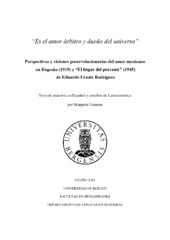| dc.contributor.author | Granum, Margrete | |
| dc.date.accessioned | 2019-12-13T03:11:27Z | |
| dc.date.available | 2019-12-13T03:11:27Z | |
| dc.date.issued | 2019-12-13 | |
| dc.date.submitted | 2019-12-12T23:00:07Z | |
| dc.identifier.uri | https://hdl.handle.net/1956/21112 | |
| dc.description.abstract | El siguiente trabajo presenta un análisis del tema del amor mexicano posrevolucionario en Eugenia: Esbozo novelesco de costumbres futuras (1919), novela pionera de la ciencia ficción hispana que cumple su centenario este año, y “El hogar del porvenir: Amor, monogamia y matrimonio” (1945), texto transcrito de una conferencia sustentada en la Universidad Autónoma de Yucatán. Ambos textos fueron escritos por Eduardo Urzaiz Rodríguez, quien era un personaje importante en el Yucatán posrevolucionario a través de sus varios campos profesionales, siendo obstétrico, psiquiatra, profesor, político socialista, autor y primer rector de dicha universidad. La investigación se basa en la identificación de los varios conceptos de amor presentados en los textos, tanto de la época del autor como previsiones de conceptos futuros del amor mexicano, y el análisis de estos en relación con el contexto histórico de la época y los conceptos teóricos del esencialismo categórico, el biologismo y el funcionalismo. El análisis de los varios conceptos muestra de qué modo el doctor Urzaiz consideraba el amor como esencial para la felicidad de los seres humanos, cómo él se imaginó el concepto de amor ideal y su opinión sobre cómo la sociedad mexicana se debería organizar para facilitar este tipo de amor. Las conclusiones reflejan tanto las percepciones de género y la visión eugenésica del autor como el proyecto político socialista del Yucatán posrevolucionario. | en_US |
| dc.description.abstract | The following work presents an analysis of the theme of love in post-revolutionary Mexico in Eugenia: Esbozo novelesco de costumbres futuras (1919), a pioneering work of Hispanic science fiction with its 100 year anniversary this year, and “El hogar del porvenir: Amor, monogamia y matrimonio” (1945), a transcript of a lecture held at la Universidad Autónoma de Yucatán. Both texts were written by Eduardo Urzaiz Rodríguez, who was an important figure in post-revolutionary Yucatán through his various fields of work, being obstetrician, psychiatrist, professor, socialist politician, author and first principal at said university. The investigation is based on identifying the various concepts of love presented in the texts, both from the time of the author and predictions of future Mexican concepts of love, and analyzing these in relation to the historical context of the era and the theoretical concepts of categorical essentialism, biologism and functionalism. The analysis of the various concepts demonstrates how doctor Urzaiz considered love as essential for human happiness, how he imagined the ideal concept of love and his opinion of how Mexican society should be organized to facilitate this type of love. The conclusions reflect the gender perceptions and eugenic vision of the author as well as the socialist political project of post-revolutionary Yucatán. | en_US |
| dc.language.iso | spa | |
| dc.publisher | The University of Bergen | |
| dc.rights | Copyright the Author. All rights reserved | |
| dc.subject | spansk science fiction ciencia ficción México den meksikanske revolusjon revolución mexicana amor love eugenismo eugenesia Yucatán Mérida Eduardo Urzaiz Rodríguez esencialismo biologismo funcionalismo utopia utopía socialismo | |
| dc.title | “Es el amor árbitro y dueño del universo”: Perspectivas y visiones posrevolucionarias del amor mexicano en 'Eugenia' (1919) y “El hogar del porvenir” (1945) de Eduardo Urzaiz Rodríguez | |
| dc.title.alternative | "Love is arbitrary and master of the universe": Mexican post-revolutionary perspectives and visions of love in 'Eugenia' (1919) and "El hogar del porvenir" (1945) by Eduardo Urzaiz Rodríguez | |
| dc.type | Master thesis | |
| dc.date.updated | 2019-12-12T23:00:07Z | |
| dc.rights.holder | Copyright the Author. All rights reserved | |
| dc.description.degree | Mastergradsoppgave i spansk og latinamerikastudier | |
| dc.description.localcode | MAHF-LÆFR | |
| dc.description.localcode | MAHF-SPLA | |
| dc.description.localcode | SPLA350 | |
| dc.subject.nus | 711128 | |
| fs.subjectcode | SPLA350 | |
| fs.unitcode | 11-20-0 | |
